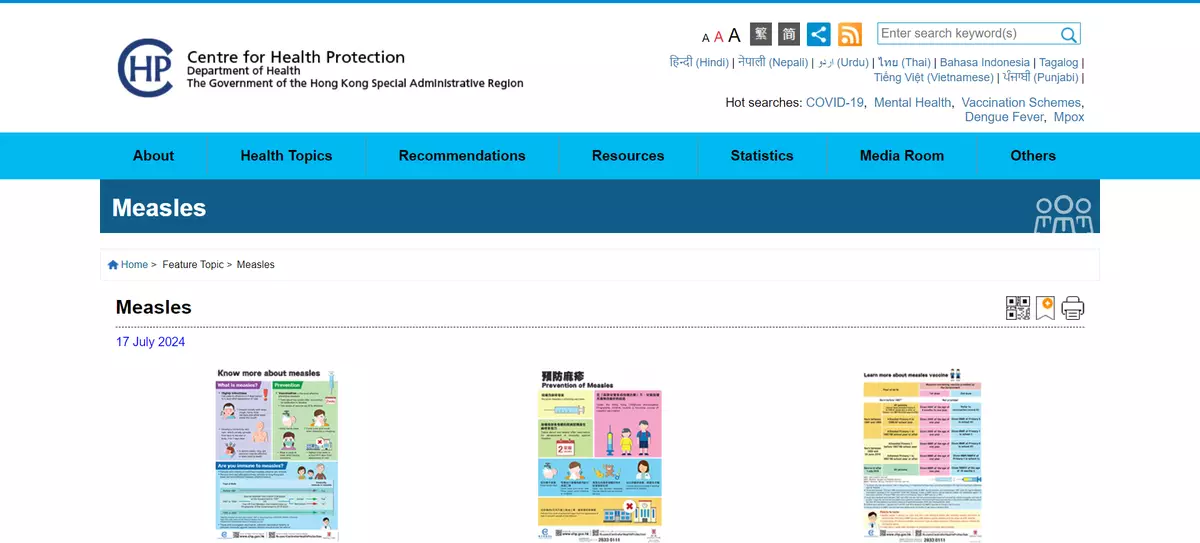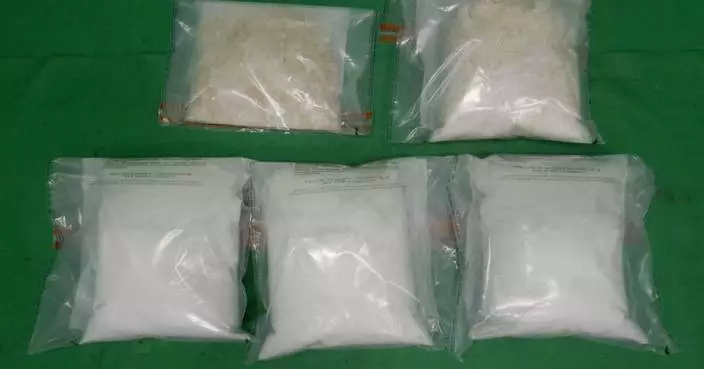CHP investigates local measles infection case and reminds public that vaccination is the most effective preventive measure
The Centre for Health Protection (CHP) of the Department of Health (DH) is today (September 20) investigating a local case of measles infection and reminded the public that vaccination is the most effective way to prevent measles, and people born outside Hong Kong who might not have received a measles vaccination during childhood should review their vaccination history.
The case involves a 57-year-old male with good past health. He had developed fever and sore throat since August 31, and developed rash on September 5. He sought medical attention from a private doctor on September 4 and 7, and attended Evangel Hospital on September 11. Due to persistent fever, cough and sore throat, he attended the Accident and Emergency Department of Queen Elizabeth Hospital (QEH) on September 12 and was admitted for treatment on the same day. He was transferred to an isolation ward of QEH on the next day. His blood sample tested positive for antibodies to measles virus upon laboratory testing. He is still hospitalised and is in stable condition after treatment.
An epidemiological investigation revealed that the patient has not received measles vaccinations and had no travel history during the incubation period. His two household contacts are currently asymptomatic. During the communicable period, the patient had visited a private clinic and Super Super Congee & Noodle located at Chuk Yuen Plaza in Wong Tai Sin. The CHP will conduct medical surveillance on four staff members and eight patients of the clinic concerned and 24 staff members of the restaurant. So far, no symptomatic person has been identified.
As measles is highly infectious, the CHP has set up an enquiry hotline (2125 2372) for contact tracing of the case. The CHP appealed to the persons who visited Super Super Congee & Noodle located at Shop S112, 1/F, Chuk Yuen Plaza, Wong Tai Sin, between 7am and 10am from September 1 to 7 to call the hotline. Officers of the CHP will assess their conditions and offer suggestions. The hotline will operate from 9am to 1pm tomorrow (September 21) and September 22, and from 9am to 5pm between September 23 and 27.
The investigations are ongoing.
"The global immunisation coverage rates have dropped since the COVID-19 pandemic. Many countries worldwide are facing a resurgence of measles outbreaks. According to the World Health Organization (WHO), the number of measles cases had risen worldwide to over 300 000 cases reported in 2023, a roughly 80 per cent increase from 2022. The Western Pacific region recorded a total of about 5 000 cases in 2023, which represented more than a 2.5 times when compared with 2022, with persistent transmission found in the Philippines and Malaysia. In view of the continuous increase in measles cases, the WHO has urged parents to bring their children to get vaccinated as early as possible to prevent measles from spreading," a spokesman for the DH said.
The CHP reiterated that vaccination is the most effective way to prevent measles. As revealed by the vaccination uptake of primary school students and the findings of the territory-wide immunisation surveys regularly conducted by the DH, the two-dose measles vaccination coverage has been consistently maintained at a high level, well above 95 per cent, and the local seroprevalence rates of measles virus antibodies reflect that most of the people in Hong Kong are immune to measles. On the whole, the information available indicates that the risk of large-scale outbreak is considered to be low in Hong Kong. However, it is possible for some not fully vaccinated people to get infected and transmit the measles virus to susceptible people (including children aged below 1 who are not due for the first dose of measles vaccine).
The spokesman reminded members of the public that delays in vaccination will weaken the protection for children against measles, and parents are reminded to maintain up-to-date vaccination for their children for comprehensive and timely protection. All people who are non-immune to measles, especially foreign domestic helpers, people working or studying in tertiary institutions, and workers of sea/land/air border control points who may be at a higher risk of contacting an imported case, should receive two doses of measles-containing vaccine. In general, people can be considered as non-immune to measles if they (i) did not have the infection confirmed by laboratory test before, and (ii) had not received two doses of measles-containing vaccines in the past, or have unknown vaccination status or unknown immunity against measles. On the other hand, as measles was endemic in Hong Kong and most parts of the world before 1967, people born before 1967 are considered to have acquired immunity to measles through natural infection.
The spokesman supplemented that, members of the public who are planning to travel to places with a high incidence or outbreaks of measles should review their vaccination history and past medical history, especially people born outside Hong Kong who might not have received a measles vaccination during childhood. Those who have not received two doses of measles-containing vaccines, with unknown vaccination history or unknown immunity against measles, are urged to consult their doctor for advice on vaccinations at least two weeks before departure.
The spokesman advised, "The incubation period (the period from infection to appearance of illness) of measles ranges from seven days to 21 days. Symptoms of measles include fever, skin rash, cough, runny nose and red eyes. If symptoms arise, members of the public should wear surgical masks, stop going to work or school and avoid going to crowded places. They should also avoid contact with non-immune persons, especially persons with weakened immunity, pregnant women and children aged below 1. Those suspected to have been infected are advised to seek medical attention as early as possible and reveal relevant contact history of measles to healthcare professionals."
Besides being vaccinated against measles, members of the public should take the following measures to prevent infection:
• Maintain good personal and environmental hygiene;
• Maintain good indoor ventilation;
• Keep hands clean and wash hands properly;
• Wash hands when they are dirtied by respiratory secretions, such as after sneezing;
• Cover the nose and mouth while sneezing or coughing and dispose of nasal and mouth discharge properly;
• Clean used toys and furniture properly; and
• Persons with measles should be kept out of school till four days from the appearance of a rash to prevent the spread of the infection to non-immune persons in school.
For more information on measles, the public may visit the CHP'smeasles thematic page. Members of the public who are going to travel can visit the website of the DH'sTravel Health Servicefor news of measles outbreaks outside Hong Kong.








